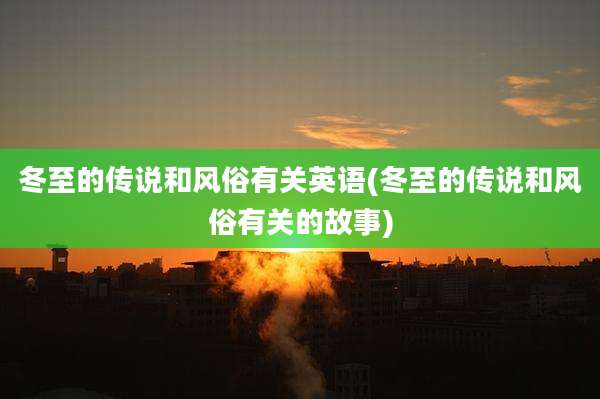冬至,又称“冬节”、“长至节”等,是中国传统节日之一,也是二十四节气中最重要的节气之一。以下是一些关于冬至的传说和风俗的英文描述:

### Legends about the Winter Solstice
1. **The God of Winter**: According to some legends, the Winter Solstice is celebrated because it marks the birthday of the God of Winter. In Chinese mythology, this deity is believed to be in charge of snow and frost, and the people pray to him for a good winter and a fruitful spring.
2. **The Great Earth's Transformation**: Another story suggests that on the Winter Solstice, the Great Earth opens up and allows all spirits to visit. This is a day of celebration to welcome these spirits and to make offerings to them for the year ahead.
3. **Heavenly Dog's Escape**: In one popular tale, a dog, after helping a hero escape from a trap set by the Demon King, managed to return to Heaven on the Winter Solstice. The people celebrate this day in honor of the brave dog.
### Customs and Traditions
1. **Eating Dumplings**: In northern China, people have the custom of eating dumplings (饺子) on the Winter Solstice. It is believed that dumplings symbolize gold or money, and eating them can bring wealth and good luck for the coming year.
2. **Jingzhu (Jing Cake)**: In southern China, especially in Guangdong Province, people often make and eat a type of cake called Jingzhu, which is a dense, sweet cake that resembles a gold coin. Similar to dumplings, it is a symbol of wealth and prosperity.
3. **Offerings**: In various regions of China, people make offerings to ancestors and gods on the Winter Solstice. These offerings may include fruits, vegetables, rice, tea, and joss sticks.
4. **Fireworks**: In some places, fireworks are set off to chase away evil spirits and to invite good fortune into the home.
5. **Special Meals**: In other areas, families prepare special meals that may include foods like fish (representing prosperity) and winter melon (symbolizing longevity).
6. **Winter Solstice Songs**: In traditional Chinese culture, people also sing songs specific to the Winter Solstice, often accompanied by the zither or other instruments, to celebrate the day and to ask for blessings.
The Winter Solstice celebrations reflect a blend of agricultural practices, spiritual beliefs, and the passage of time, making it a deeply meaningful and culturally rich holiday in China.
「点击下面查看原网页 领取您的八字精批报告☟☟☟☟☟☟」
